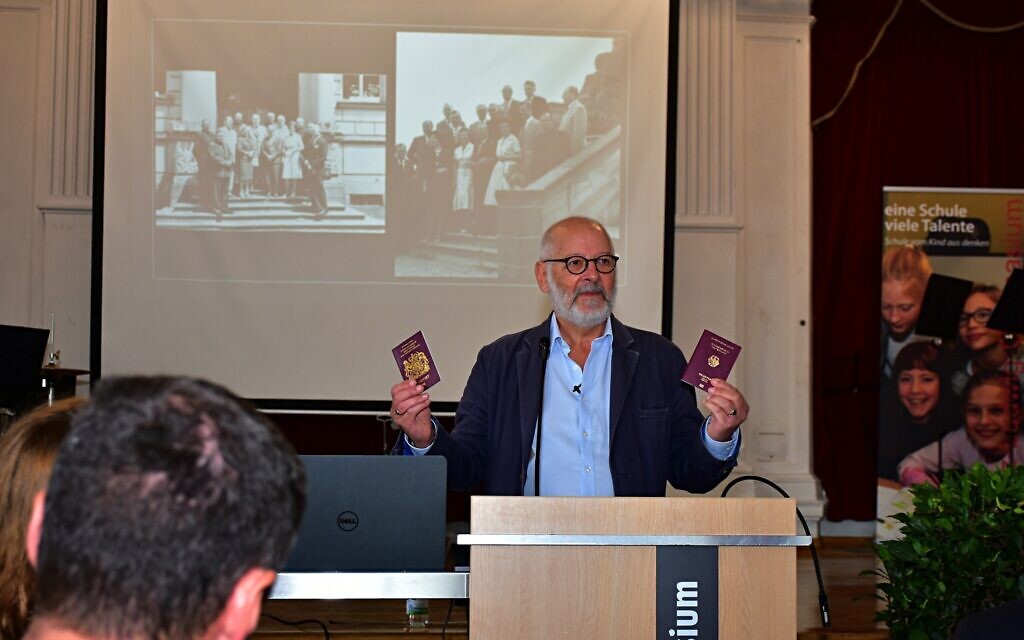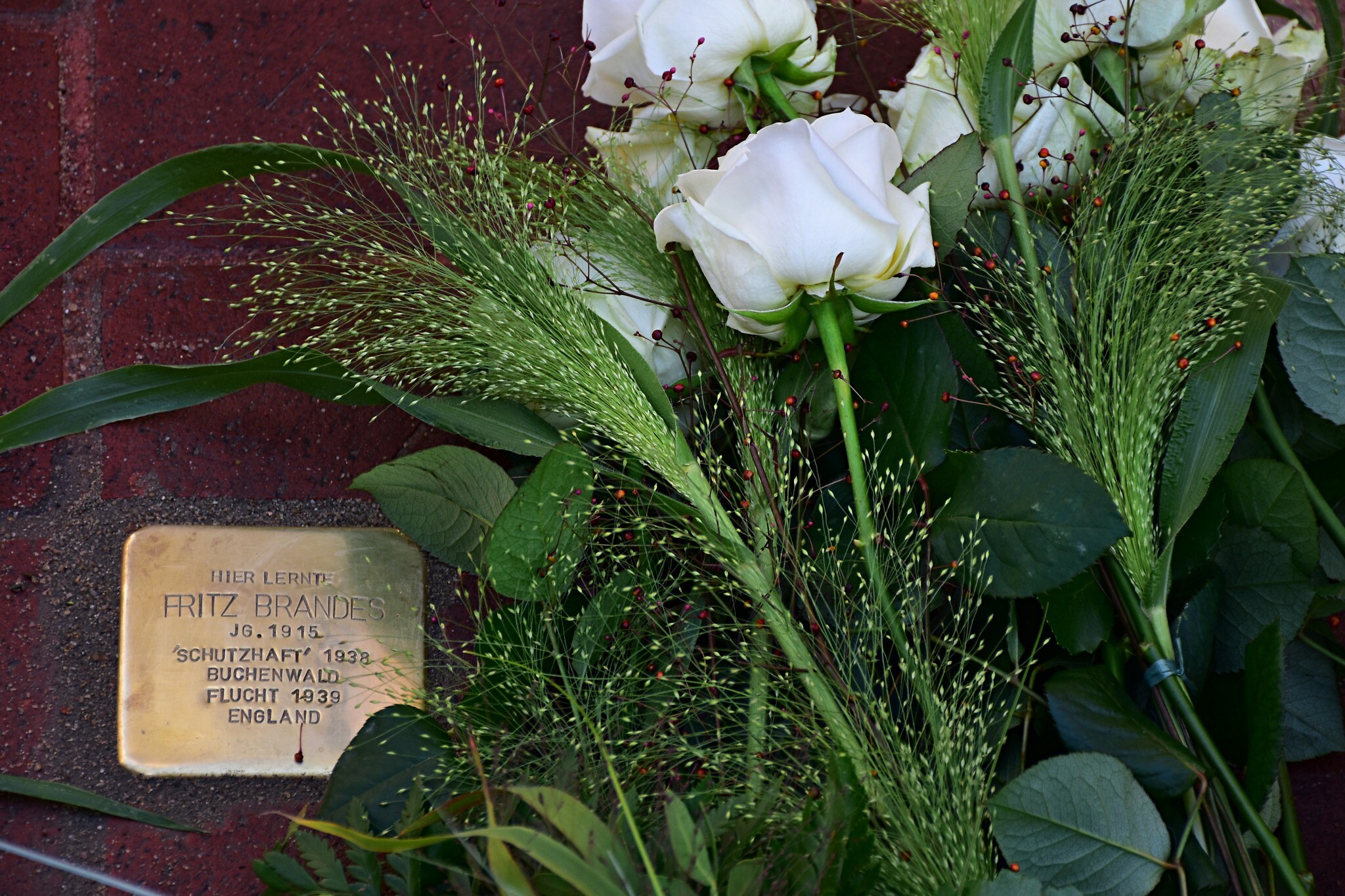Why did the son of a Holocaust survivor apply for a German passport?
Despite the horrors his family endured, former Labour MP and author Peter Bradley has reconciled with modern Germany

It’s arrived. My new passport. My new, red passport. My German passport.
It means so many things to me, this German passport: a small personal protest against this country’s growing insularity; a symbolic embrace of something more generous; a reconnection with the lost generations of my family; an act of remembrance, and of reconciliation.
I’m British. I grew up here. I have no plans to live elsewhere. I feel no less English for the fact that I’m now also a German citizen. But I love my country more for what it could be than what it’s become.
Get The Jewish News Daily Edition by email and never miss our top stories Free Sign Up
But for Brexit, I doubt I would have taken this course. For most of my adult life, I’ve enjoyed the rights and freedoms of a European. And for me, the EU has represented something still more significant. Whatever its deficiencies, it has brought nations and peoples closer together and, after centuries of bloodletting, helped to preserve peace in Europe for three generations. That so many Britons could reject that legacy, preferring instead a narrow and often xenophobic nationalism, has been profoundly disillusioning. My new passport is my small protest.
It offers, of course, no protection from the economic, political and reputational damage Brexit has already inflicted on Britain. But I have at least recovered my precious right to free movement in Europe. Once again, I’m able to embrace, and be embraced by, a greater sense of fellowship than our isolating exceptionalism allows.
My decision has not been straightforward. It’s just six months since the publication of my book The Last Train – A Family History of the Final Solution. In November 1941, that train bore my grandparents, Sally and Bertha Brandes, from their home in Bamberg to their deaths in Latvia.
So why would a Jew who has just documented the destruction of his family by the Nazis wish to become a German?
It has much to do with the contrasting ways our two nations engage with their histories and imagine their futures. I was born just a couple of months before the late Queen’s coronation. She was a constant in my life as in so many others. Yet there was something about the national mourning of her death which I found troubling. The British establishment does pageantry very well. It’s as if its very existence depends on it – and, to a significant degree, it does. The ten days of grieving, the funeral itself, the dismissal of dissenting voices, were in large part about the preservation of the status quo, and, inherently, the nostalgic, outdated image we have of ourselves in a world which has changed so radically since the 1950s. For the British, tradition is both a rock and a deadweight.
We have not come to terms with our history in the way that the Germans have with theirs. They had no choice. We have avoided ours. Yet, as the Germans have shown, acknowledging their unalterable past does not inhibit their capacity to shape their future, far from it. By the same token, a balanced appraisal of Britain’s imperial legacy should not enfeeble us today. Love of country should inspire us not constantly to look back, but confidently to look forward. We should be striving to make our country not so much ‘great again’ as, simply, great.
I cannot forget what happened to my family. And whether I forgive those who persecuted and finally murdered my grandparents is immaterial. But I can be reconciled with modern Germany and modern Germans – and I am.

Last month, my sister and I visited my father’s home city of Bamberg to celebrate the laying of three Stolpersteine, ‘stumbling stones’, the little brass plaques placed in the pavement outside the former homes of Jews who fled from or perished under the Nazis. There are now two for my father, one alongside his parents’, opposite the site of the grand synagogue which burned on Kristallnacht, the other at the entrance to the school from which, in 1935, he was the last Jew to graduate under the Nazis. The third is for his aunt Meta whose days ended in Theresienstadt.
These Stolpersteine, three of almost 100,000 which now punctuate streets all over Europe, are all sponsored and curated by local volunteers. They are modest little memorials. But they are more than that, for they are designed to make the mind stumble, just occasionally to cause those who step over them to pause and contemplate how they came to be there.
They are a remembrance, not a rebuke. My father would, I believe, be happy that he is once more remembered in the city which, despite everything, he loved. And so this act of commemoration is also an act of reconciliation and a natural postscript to my book.
In building their new democracy, the Germans have learned much from the British. The British would do well to learn from the Germans how to cope with the past and, by so doing, embrace a better future.
The Last Train – A Family History of the Final Solution by Peter Bradley was published in May 2022 by HarperNorth

Thank you for helping to make Jewish News the leading source of news and opinion for the UK Jewish community. Today we're asking for your invaluable help to continue putting our community first in everything we do.
For as little as £5 a month you can help sustain the vital work we do in celebrating and standing up for Jewish life in Britain.
Jewish News holds our community together and keeps us connected. Like a synagogue, it’s where people turn to feel part of something bigger. It also proudly shows the rest of Britain the vibrancy and rich culture of modern Jewish life.
You can make a quick and easy one-off or monthly contribution of £5, £10, £20 or any other sum you’re comfortable with.
100% of your donation will help us continue celebrating our community, in all its dynamic diversity...
Engaging
Being a community platform means so much more than producing a newspaper and website. One of our proudest roles is media partnering with our invaluable charities to amplify the outstanding work they do to help us all.
Celebrating
There’s no shortage of oys in the world but Jewish News takes every opportunity to celebrate the joys too, through projects like Night of Heroes, 40 Under 40 and other compelling countdowns that make the community kvell with pride.
Pioneering
In the first collaboration between media outlets from different faiths, Jewish News worked with British Muslim TV and Church Times to produce a list of young activists leading the way on interfaith understanding.
Campaigning
Royal Mail issued a stamp honouring Holocaust hero Sir Nicholas Winton after a Jewish News campaign attracted more than 100,000 backers. Jewish Newsalso produces special editions of the paper highlighting pressing issues including mental health and Holocaust remembrance.
Easy access
In an age when news is readily accessible, Jewish News provides high-quality content free online and offline, removing any financial barriers to connecting people.
Voice of our community to wider society
The Jewish News team regularly appears on TV, radio and on the pages of the national press to comment on stories about the Jewish community. Easy access to the paper on the streets of London also means Jewish News provides an invaluable window into the community for the country at large.
We hope you agree all this is worth preserving.
-
By Brigit Grant
-
By Laurent Vaughan - Senior Associate (Bishop & Sewell Solicitors)
-
By Laurent Vaughan - Senior Associate (Bishop & Sewell Solicitors)
-
By Laurent Vaughan - Senior Associate (Bishop & Sewell Solicitors)
-
By Laurent Vaughan - Senior Associate (Bishop & Sewell Solicitors)





















